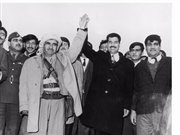اتفاقية الحكم الذاتي للأكراد

اتفاقية الحكم الذاتي للأكراد المبرمة في 11 مارس 1970 بين الحكومة العراقية والزعيم الكردي الملا مصطفى البارزاني وفيه اعترفت الحكومة العراقية بالحقوق القومية للأكراد مع تقديم ضمانات للأكراد بالمشاركة في الحكومة العراقية واستعمال اللغة الكردية في المؤسسات التعليمية ولكن لم يتم التوصل إلى حل حاسم بشأن قضية كركوك التي بقيت عالقة بانتظار نتائج إحصاءات لمعرفة نسبة القوميات المختلفة في مدينة كركوك.
هذه العملية الإحصائية كانت أمل الأكراد بإظهار الهوية الكردية لمدينة كركوك نتيجة لقناعة الأكراد بتفوقهم العددي في مدينة كركوك وضواحيها بالإضافة إلي مدينة خانقين الواقعة جنوب شرقي مدينة كركوك. تم التخطيط لإجراء تلك الإحصائية المهمة عام 1977 م ولكن اتفاقية آذار كانت ميتة قبل ذلك التاريخ حيث ساءت علاقات الحكومة العراقية مع الزعيم الكردي الملا مصطفى البارزاني وخاصة عندما أعلن البارزاني رسميا حق الأكراد في نفط كركوك. اعتبرت الحكومة العراقية إصرار الأكراد بشأن كردية كركوك كإعلان حرب حيث حدى بالحكومة العراقية في آذار 1974 إلى إعلان الحكم الذاتي للأكراد من جانب واحد فقط دون موافقة الأكراد الذين اعتبروا الإتفاقية الجديدة بعيدة كل البعد عن إتفاقيات سنة 1970 م حيث لم تعتبر إعلان 1974 مدينة كركوك وخانقين وجبل سنجار من المناطق الواقعة ضمن مناطق الحكم الذاتي للأكراد وقامت الحكومة العراقية بالإضافة إلى ذلك بإجراءات إدارية شاملة في مدينة كركوك كتغير الحدود الإدارية للمدينة بشكل يضمن الغالبية العددية للعرب في كركوك وأطلقت تسمية محافظة التأميم على المنطقة.
البنود
- The Kurdish language shall be, alongside the Arabic language, the official language in areas with a Kurdish majority; and will be the language of instruction in those areas and taught throughout Iraq as a second language.
- Kurds will participate fully in government, including senior and sensitive posts in the cabinet and army.
- Kurdish education and culture will be reinforced.
- All officials in Kurdish majority areas shall be Kurds or at least Kurdish-speaking.
- Kurds shall be free to establish student, youth, women's and teachers' organisations of their own.
- Funds will be set aside for the development of Kurdistan.
- Pensions and assistance will be provided for the families of martyrs and others stricken by poverty, unemployment or homelessness.
- Kurds and Arabs will be restored to their former place of habitation.
- The Agrarian Reform will be implemented.
- The Constitution will be amended to read "The Iraqi people is made up of two nationalities, the Arab nationality and the Kurdish nationality."
- The broadcasting station and heavy weapons will be returned to the Government.
- A Kurd shall be one of the vice-presidents.
- The Governorates (Provincial) Law shall be amended in a manner conforming with the substance of this declaration.
- Unification of areas with a Kurdish majority as a self-governing unit.
- The Kurdish people shall share in the legislative power in a manner proportionate to its population in Iraq.[1]
التنفيذ
Tariq Aziz retrospectively stated "We were sincere when we announced the 11 March Manifesto. It wasn't propaganda." Mulla Mustafa Barzani saw it as too good to be true, but signed nevertheless due to pressure from the Kurdish communities.[2]
Within a month of signing, most articles were implemented, and by December Mulla Mustafa Barzani was optimistic about autonomy, but by the end of the year it became clear that the Ba'ath party was just playing for time, as there was an attempt on his son's life. The census for disputed areas was postponed twice, and by 1973 the Accord had collapsed.[3]
انظر أيضاً
الهامش
- ^ Mcdowall, David. A Modern History of the Kurds. IB Tauris & Co., New York. 2004. Pages 327–328.
- ^ Mcdowall, 2004. Page 328.
- ^ McDowall, David (2003-10-24). Modern History of the Kurds (in الإنجليزية). I.B.Tauris. pp. 329–332. ISBN 9780857714824.
